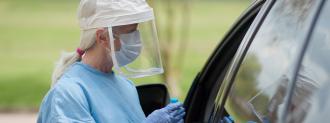Until someone develops an effective coronavirus treatment or vaccine, we need to do everything we can to minimize the spread of COVID-19 by keeping people with the virus away from those who don’t have it.
That means anyone who thinks they might be infected should get tested for the coronavirus as soon as possible — here’s how to make that happen.
Where Can You Get Tested for the Coronavirus?
The most convenient — and safe — place to get tested for the coronavirus is right in your own home, and for healthcare providers, that’s been an option ever since the FDA authorized the first at-home coronavirus test kit.
The company behind that kit, LabCorp, said on April 21 that it plans to make the test available to the general public in the coming weeks. Until then, though, most people will need to venture out of their homes to get tested for the coronavirus.
The vast majority of testing takes place at hospitals and medical clinics.
Currently, the vast majority of testing takes place at hospitals and medical clinics, though CVS, Walgreens, and other retailers are offering testing at about 70 locations across the nation.
To find a test site, you can contact your primary care physician or search your local government’s health department website.
Alternatively, you can check a dedicated testing site locator, like the platform created by Georgetown University startups The Social App and Basil Labs.
It allows you to filter results to find sites that only test children, for example, or those that offer drive-thru testing, which can limit your potential contact with infected people.
Many states are currently experiencing a shortage of testing supplies, though, so finding a testing site is just step one — you’ll also want to contact the site to make sure they have kits available and schedule an appointment.
Symptomless COVID-19 Testing
Today, most places will only test people who are experiencing coronavirus symptoms and have a referral from a healthcare provider.
But some people who catch the virus never experience symptoms — and without a confirmed diagnosis, they may act in ways that increase their chances of spreading the virus to others.
The exclusion of asymptomatic people from diagnostics testing is starting to change, so if you want to get tested even though you feel fine, you do have a few options.
On April 29, Los Angeles became the first major city in the U.S. to offer COVID-19 testing to all residents. The tests will be free and open to anyone living in L.A. County, but those with symptoms and first responders will be given priority.
Asymptomatic people who live near nine other major U.S. cities, including New York, Chicago, and Seattle, can also get tested for the coronavirus now through membership-based healthcare organization One Medical.
On April 17, the company announced that it was opening up its COVID-19 testing to people without symptoms. It’s even offering a free 30-day membership to anyone who wants it, giving people who aren’t already members access to its virtual healthcare team and testing services.
Testing Sites Coming Soon
As of April 25, the U.S. was processing between 1.5 million and 2 million coronavirus tests every week, Anthony Fauci, director of the National Institute of Allergy and Infectious Diseases, reported.
That’s a huge increase over where it was a month prior, but Fauci believes we need to at least double that figure in the coming weeks in order to safely begin reopening parts of the economy.
The retailers already offering COVID-19 testing could play a major role in getting us there.
On April 27, CVS, Walgreens, and several other retailers announced plans to dramatically increase the number of locations where people can get tested for the coronavirus, from the current 69 up to nearly 2,000 by the end of May.
CVS expects to be able to process 1.5 million tests per month.
All of the testing will take place at drive-thrus outside of the stores, too, meaning the increase in testing sites shouldn’t put other shoppers at a higher risk of catching the coronavirus.
CVS alone said it expects to be able to process 1.5 million tests per month — about a fourth of the number Fauci thinks the nation needs overall.
“Our industry has been united by the unique role we can play in addressing the pandemic and protecting people’s health,” CVS CEO Larry Merlo said in a statement.
“We all share the same goal,” he continued, “and that’s dramatically increasing the frequency and efficiency of testing so we can slow the spread of the virus and start to responsibly reopen the economy when experts tell us it’s safe.”
We’d love to hear from you! If you have a comment about this article or if you have a tip for a future Freethink story, please email us at [email protected].






